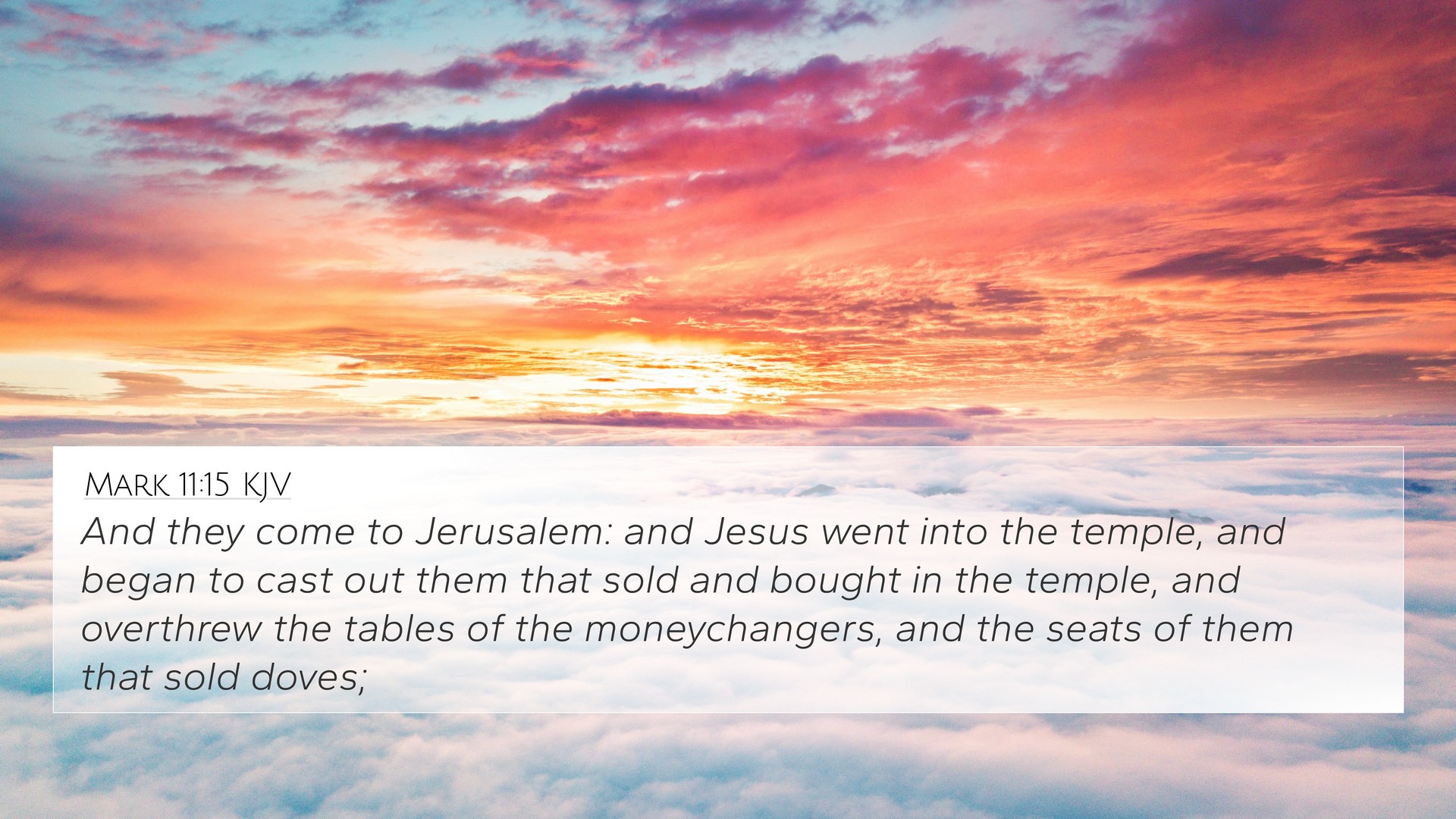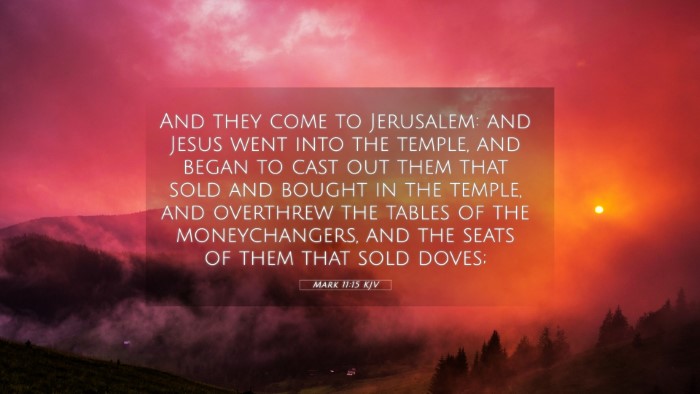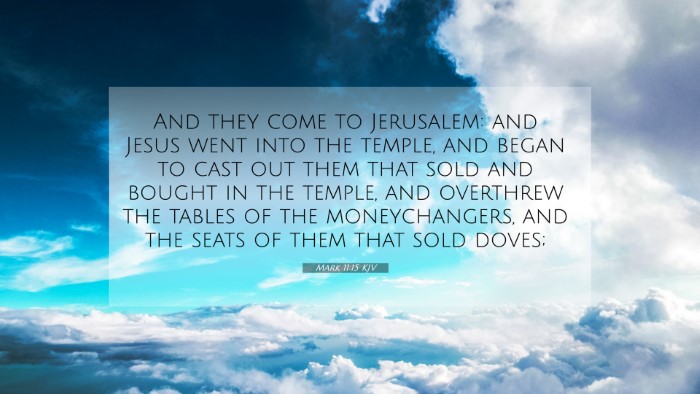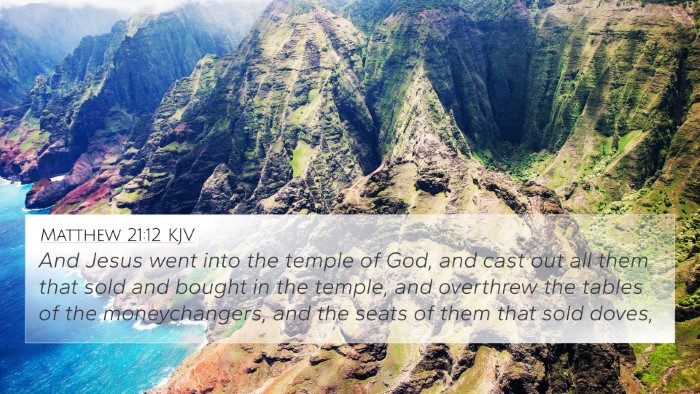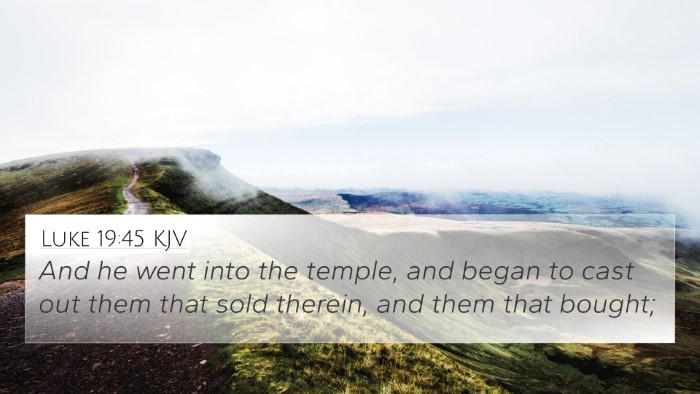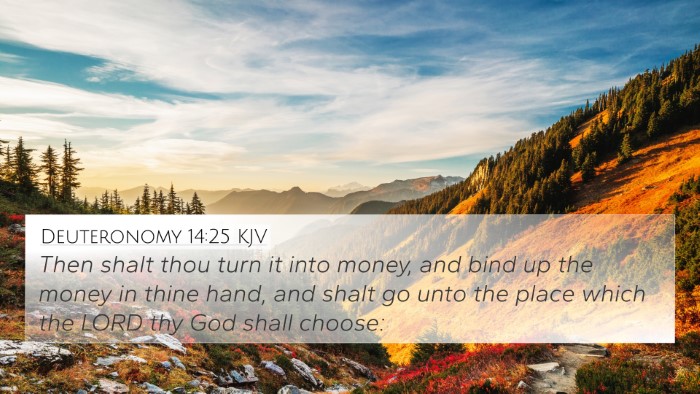Understanding Mark 11:15
Mark 11:15 states, "And they come to Jerusalem: and Jesus went into the temple, and began to cast out them that sold and bought in the temple, and overthrew the tables of the moneychangers, and the seats of them that sold doves." This profound act of Jesus conveys significant themes of purity, authority, and a reflection on the purpose of worship.
Commentary Insights
The insights from various public domain commentaries such as those by Matthew Henry, Albert Barnes, and Adam Clarke contribute to a deeper understanding of this verse.
Matthew Henry's Commentary
Henry emphasizes the importance of the temple as a sacred space, stating that Jesus' actions symbolized the necessity of keeping the house of God holy. The selling and buying within the temple precincts reflected corruption and a misunderstanding of worship, which Jesus sought to correct. This act signifies a challenge to the commercialization of spiritual practices.
Albert Barnes' Commentary
Barnes adds that Jesus’ actions were a fulfillment of prophetic scripture, notably referencing Isaiah 56:7 and Jeremiah 7:11. By cleansing the temple, Jesus reveals the sacredness expected in religious places and criticizes those who prioritize profit over piety. He points out that Jesus sought to restore true worship and established order within God’s house.
Adam Clarke's Commentary
Clarke highlights the authority of Jesus in this narrative. He notes that His actions were both a demonstration of His divine authority and a prophetic declaration. The mention of moneychangers suggests a systemic issue within the temple's practices, indicating that spiritual life was being undermined by financial interests. Clarke emphasizes the dual need for both external conduct and internal devotion in worship.
Bible Verse Cross-References
This verse connects to several other scriptural texts that illuminate its meaning further:
- Isaiah 56:7: "Even them I will bring to my holy mountain, and make them joyful in my house of prayer: their burnt offerings and their sacrifices shall be accepted upon mine altar; for mine house shall be called a house of prayer for all people."
- Jeremiah 7:11: "Is this house, which is called by my name, become a den of robbers in your eyes? Behold, even I have seen it, saith the Lord."
- Matthew 21:12-13: This passage parallels Mark 11:15, reinforcing the cleansing of the temple narrative, emphasizing Jesus' condemnation of commercial activities in sacred spaces.
- John 2:14-16: Another account of Jesus driving out merchants and explaining that His Father's house should not be made a house of merchandise.
- Luke 19:45-46: Similar cleansing act accounted by Luke, highlighting the prophetic fulfillment and Jesus' ministry focus.
- Psalm 69:9: “For the zeal of your house has consumed me…” This verse helps frame Jesus’ passionate response to the desecration of the temple.
- Malachi 1:10: "Oh that there were one among you that would shut the doors, that ye might not kindle fire on mine altar in vain..." Resounding similar concerns regarding worship practices.
Connections between Bible Verses
Mark 11:15 showcases the interconnectedness of biblical themes: worship, reverence for God’s house, and righteousness. The act of cleansing the temple is an invitation to understand the correlation between external acts of worship and the internal state of one’s heart. These themes resonate throughout both the Old and New Testaments, revealing a continuous dialogue about the nature of true devotion.
Tools for Bible Cross-Referencing
Utilizing a Bible concordance or a cross-reference guide enhances the understanding of inter-Biblical dialogue. It aids in how to find cross-references in the Bible and emphasizes the importance of identifying connections between Old and New Testament. By engaging in cross-reference Bible study, readers can draw parallels that provide deeper insight into the life and teachings of Christ.
Conclusion
Jesus' cleansing of the temple in Mark 11:15 serves as a powerful reminder of the sacredness expected in worship. The various commentaries reflect on the significance of maintaining the purity of spiritual practices. Through scriptural cross-referencing, believers gain a richer understanding of the thematic connections throughout the Bible and the importance of aligning worship with true devotion.
